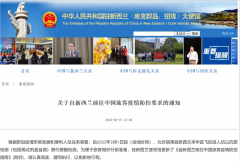加拿大华人论坛 加拿大百科讲英语连词滥用惹人烦
在加拿大
学英语的时候大家可能都被建议模仿老外常挂嘴边的语气词诸如well,actually,you know之类,但注意,这些词用多了,你的句子就会变得凌乱而没有条理,让听者生厌,就像中文中那个被滥用无数遍的万能连词“然后”。这里作者痛批了like这个词在口语中的滥用,大家要引以为戒哦。 When Caroline Kennedy managed to say “you know” more than 200 times in an interview with the New York Daily News, and on 130 occasions while talking to The New York Times during her uninspired attempt to become a hereditary senator, she proved, among other things, that she was (a) middle-aged and (b) middle class. If she had been a generation younger and a bit more déclassé, she would have been saying “like。” When asked if the Bush tax cuts should be repealed, she responded: “Well, you know, that’s something, obviously, that, you know, in principle and in the campaign, you know, I think that, um, the tax cuts, you know, were expiring and needed to be repealed。” 当卡罗琳・肯尼迪毫无创见地试图延续肯尼迪家族的传统当选参议员时,她在纽约日报的采访中说了超过200遍的“你知道”,在与纽约时报记者谈话中也使用了130次这句“你知道”。通过其他事情,她证明自己是一个中产阶级的中年妇女。如果她是年轻一代中家世不那么高贵一个人,她会使用“like”这个词。当被问道是否该取消布什总统的减税方案,她回答道:“嗯,你知道,显然,这是一件,你知道,有关原则和竞选的事件,你知道,我觉得,嗯,减税么,你知道,期限到了,必须终止。” This is an example of “filler” words being used as props, to try to shore up a lame sentence. People who can’t get along without “um” or “er” or “basically” (or, in England, “actually”) or “et cetera et cetera” are of two types: the chronically modest and inarticulate, and the mildly authoritarian who want to make themselves uninterruptible。 这个例子展示了“填充语”是怎么被用来支撑软弱无力的句子。那些不加上“嗯”“呃”或“基本上”(在英国,“事实上”)“等等等等”就没办法讲话的人可以分成两种:不善言辞并口齿不清;不希望被人打断的轻度自我主义者。
评论
FN: 2007年10月31日There are things you wish for and accomplishments you work for.Nothing expresses your pure joy like a Canada Permanent Residence visa... 超赞 赏 cindyycm 0$(VIP 0) 31,1332010-04-07#2 回复: 讲英语连词滥用惹人烦Many parents and teachers have become irritated to the point of distraction at the way the weed-style growth of “like” has spread through the idiom of the young. And it’s true that in some cases the term has become simultaneously a crutch and a tic, driving out the rest of the vocabulary。 许多父母和老师已经对年轻人口中如荒草蔓延般的“like”烦不胜烦,根本听不下去了。有的时候这个词已经同时成为言语支柱和口头禅,让其他词汇毫无立足之地。 It was then a part of the Californianization of American youth-speak. In an analysis Penelope Eckert and Norma Mendoza-Denton phrase matters this way: “One of the innovative developments in the white English of Californians is the use of the discourse-marker ‘I’m like’ or ‘she’s like’ to introduce quoted speech, as in ‘I’m like, where have you been?’ This quotative is particularly useful because it does not require the quote to be of actual speech (as ‘she said’ would, for instance). A shrug, a sigh, or any of a number of expressive sounds as well as speech can follow it。” 这个词曾是加州化的美国年轻人用语之一。Penelope Eckert和Norma Mendoza-Denton分析说:“加州白人的英语有一个创新性的发展,就是使用话语标记'I'm like'或者'She's like'来带出引语,就像‘我就问,你去哪了?’这个引语标记很有用,因为它不要求其后的引语是直接引语(“她说”后面就要接直接引语)。耸肩、叹气或者其他任何具有表达意味的声音都可以作为引语跟随其后。 It can be used as a pause or a colon: very handy for spinning out a mere anecdote into a playlet that’s full of parody and speculation. And also of hyperbole, as in “She’s been out with, like, a million guys。” 这个词可以作为停顿或冒号:将一件小事渲染成充斥着滑稽模仿和揣测的短剧时,这个词用起来很方便。也可用于夸张语气,比如说“她差不多跟一百万个男生约会过。” The little cringe and hesitation and approximation of “like” are a help to young people who are struggling to negotiate the shoals and rapids of ethnic identity, the street, and general correctness. To report that “he was like, Yeah, whatever” is to struggle to say “He said” while minimizing the risk of commitment。 like这个词所代表的保留态度、犹豫和模棱两可能帮助年轻人处理棘手的种族身份意识、社交生活和言语得体问题。说 “他啊,怎么说呢,呃……”就等于是在想尽方法阐释“他说过……”,同时减低话说出去就收不回的风险。 The actual grammatical battle was probably lost as far back as 1954, when Winston announced that its latest smoke “tasted good, like a cigarette should。” Complaints from sticklers that this should have been “as a cigarette should”were met by a second ad in which a gray-bunned schoolmarm type was taunted by cheery consumers asking, “What do you want, good grammar or good taste?” Usage of “like” has now almost completely replaced “as” 。 1954年的时候这场语法之争就差不多尘埃落定了,那时温斯顿香烟发布了最新的广告“好烟当如是”,看重细节的观众们抱怨说其中的“like”应该改成“as”,然而温斯顿的第二支广告很快对此作出回应,其中一个欢呼的人群嘲笑梳着灰白发髻的女教师,并问“你是要完美的语法还是完美的味道?”现在,like已经差不多完全取代了as。 How could one preserve what’s useful about “like” without allowing it to reduce everyday vocabulary? The restoration of the word “as,” which isn’t that hard a word to master, along with “such as,” would also be a help in varying the national lingo. A speech idiosyncrasy, in the same way as an air quote, is really justifiable only if it’s employed very sparingly and if the user consciously intends to be using it. Just to try to set an example,I have managed to write all the above without using the word once, except in inverted commas. Why not try it? You might, like, like it。 我们怎么才能在保持like真正有用之处的情况下防止它侵略其他词汇的领地呢?恢复使用as这个不难学的词,以及 such as,也许能使我们的用语更多样化。言语怪癖和航空报价一样,只有在偶尔使用并且使用者有意识去使用的时候才说得过去。为给大家树立榜样,我在写这篇文章的时候没有一处用到like,除了引号内的内容。为什么不试试呢?你也许,怎么说呢,喜欢这样。
·加拿大新闻 省钱机会来了!2026年加拿大出发,飞亚洲、欧洲机票降价!
·加拿大新闻 全球退休天堂排名东南亚、欧洲多国成加拿大人新宠
·加拿大新闻 卑诗保守党宣布成立党领选举委员会
·加拿大新闻 剑桥硕士面试小学英语教培被刷竞争者有北大博士
·加拿大新闻 奥迪2025年销量确认:一汽、上汽奥迪总销量超61万辆
·汽车 低于 10k 的 4x4 值得吗?
·汽车 廉价货车轮胎

